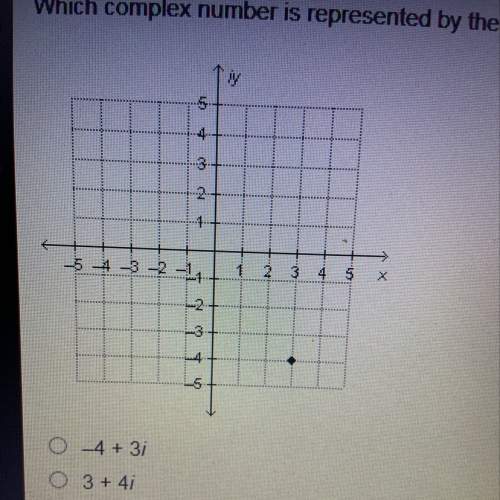
Mathematics, 02.04.2020 21:36 amulets8409
What will happen if you try to use completing the square to solve an equation of the form x^2 + bx + c = 0 in which c > (b/2)^2 ?
A. There will be infinite solutions. After you have completed the square, both sides of the equation are negative.
B. There will be two solutions. After you have completed the square, the right side of the equation will be negative.
C. There will be one solution. After you have completed the square, neither side of the equation is negative.
D. There will be no real solutions. After you have completed the square, the right side of the equation will be negative.

Answers: 1


Another question on Mathematics

Mathematics, 21.06.2019 19:30
John checked his watch and said that it is thursday, 7 am. what will the day and time be 2006 hours plzzz i will give you 100 points
Answers: 1

Mathematics, 21.06.2019 20:30
Which shows the graph of the solution set of 3y – 2x > –18?
Answers: 1

Mathematics, 22.06.2019 00:00
The data set represents the ages of players in a chess club. 27, 34, 38, 16, 22, 45, 54, 60. what is the mean absolute deviation of the data set?
Answers: 3

Mathematics, 22.06.2019 03:00
Suppose that prices of a gallon of milk at various stores in one town have a mean of $3.71 with a standard deviation of $0.10. using chebyshev's theorem, what is the minimum percentage of stores that sell a gallon of milk for between $3.41 and $4.01? round your answer to one decimal place.
Answers: 2
You know the right answer?
What will happen if you try to use completing the square to solve an equation of the form x^2 + bx +...
Questions

History, 10.07.2021 21:40


Mathematics, 10.07.2021 21:40

Physics, 10.07.2021 21:40

Mathematics, 10.07.2021 21:40


English, 10.07.2021 21:40

Mathematics, 10.07.2021 21:40

English, 10.07.2021 21:50


Mathematics, 10.07.2021 21:50

Mathematics, 10.07.2021 21:50


Mathematics, 10.07.2021 21:50



English, 10.07.2021 21:50

Mathematics, 10.07.2021 21:50


Mathematics, 10.07.2021 21:50




